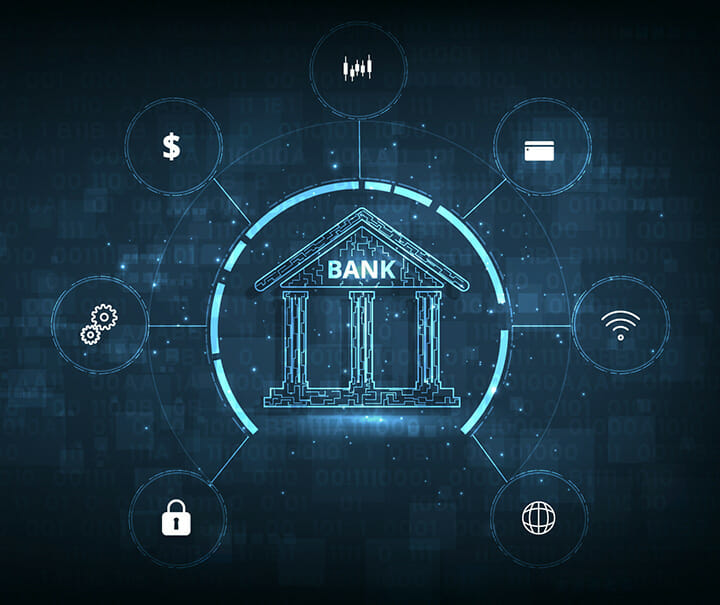A Modern Core Banking System at Its Core
“It runs just fine,” is a response we often hear when we ask a banker, “How would you describe your core system?”
But with the advent of digital banking products, cloud systems, and APIs, a core system should be more than “just fine.”
To be a truly modern core system, it should have powerful capabilities that offer a multitude of benefits to your staff, your bank, and your bank’s customers. It works smarter, is efficient, more cost-effective, and, perhaps more importantly, compliant.
Banks are now expected to process transactions in real time, release new features quickly and frequently, and be able to scale (up and down) their infrastructure needs at will. Customers are demanding innovation and competitors are obliging. And on top of all that, regulators are keeping a closer eye, ensuring that whatever advancements you make protect the customer.
A system that is cloud ready, with an open architecture that possesses (and welcomes) technology innovations and developments in digital and core banking, that is enveloped in a security-focused platform is a modern core banking system.
Offerings and Capabilities
With modern core banking technology gaining momentum, there’s no reason why your bank shouldn’t have access to newer and more powerful capabilities to optimize operations and customer service. The following are just a few developments we’re seeing banks considering.
Open Banking & APIs
API
With API Banking, the bank gives the customer more control over their data while the third party gets the opportunity to offer its services to the bank’s customers. There are several types of API Banking with Open Banking and BaaS being the most familiar.
Open Banking
Open Banking is when non-banks use an API to access data from a bank’s customer’s account to provide account insights or trigger payments within an app or website. Examples include: savings notifications, account aggregation, and new account origination.
Banking as a Service
Banking as a Service (also referred to as Platform Banking or Embedded Banking from some sites) is when licensed banks enable non-banks to integrate digital banking and payment services to their own products. Examples include: lending,
fraud management, and investment solutions.
Digital Banking Services
Online Account Opening
With an online account opening product, you can give customers access to opening checking and savings accounts online and be able to send those records directly to the core after verifying and submitting applications.
Loan Origination
Banks can digitize the lending process with a range of technology solutions available, including mobile apps, cloud computing, and predictive analytic software. Such solutions streamline lending operations; enable faster loan decisions that increase customer satisfaction; and strengthen fraud detection and risk management efforts.
Commercial Cash Management
For banks whose customers are on the commercial side, it’s important to have an advanced cash management tool that gives users the ability to manage their personal and business accounts in the same session. Moreover, a commercial cash management tool can be integrated with your company’s online banking so that your customers have access to funds all day, every day.
Back-Office Integrations
Document Management
Managing your documents in one place can be overwhelming and downright stressful if you’re not confident in your system’s security capabilities. With a centralized, enterprisewide document management tool, your bank can manage, share, and protect files across your business.
BSA/AML Compliance
With the passing of the AML Act of 2020 (AMLA), institutions have been called on more than ever to improve the efficiency and effectiveness of BSA/AML programs. Modern, cloud-based solutions alert your institution of unusual behavior, helping strengthen your fraud detection, BSA/ AML compliance, high-risk customer management, and information sharing initiatives.
Dynamic Reporting
Overview
Whether your goal is to grow your bank or maintain compliance, you need to ensure your system includes modern reporting that offers efficient, customizable, and automated reporting at all levels. Take a look at two reporting options below.
Template Reports
One option you get with dynamic reporting is the ability to access report templates, so you don’t have to worry about creating reports from scratch. For example, IBT Apps’ Simple Report Writer gives you access to 300+ report templates.
Custom Reports
For those with experience in data, analytics, and coding, you have the option to configure your own reports. At IBT Apps, you have a report-building tool like Expert Report Writer that lets you customize and write your own reports.
Modern Core Banking Benefits
There are a multitude of reasons and benefits to justify an investment in modern core banking. They can be broke out into business, technology, and operations, and include the following:
Business
- Increases revenue opportunities through new product offerings and intel from dynamic reporting
- Raises competitive profile through enhanced digital offerings
- Shortens product delivery times, which increases ROI
Technology
- Reduces IT maintenance
- Increases cost savings when integrating stand-alone applications
- Improves compliance and decreases risk with enhanced security capabilities and protocols
Operations
- Minimizes (if not eliminates) manual activities, which increases labor savings and creates more efficiencies
- Streamlines end-to-end business processes, which increases productivity and optimizes customer service
- Increases operational savings from front-to-back office integration

Why Legacy Systems Fall Flat
There are three huge reasons why bankers need to move away from legacy systems and look into modern core options. Select each tab for more details.
They are vulnerable to service disruptions and security breaches.
Many legacy vendors are no longer updating their technology and/or they’re sunsetting their systems. This means security updates fall by the wayside.
Failing to conduct critical updates makes the bank an easier target for cyberattacks. If your bank’s data is compromised, not only is your bank’s reputation at stake, you run the risk of hefty compliance violations to overcome.
Its closed architecture creates roadblocks for modernization of all channels.
Legacy systems don’t have the agile infrastructure in place to continue developing and creating the products and services bankers need to grow their business. This means your bank won’t be able to stay competitive with the changing landscape.
If your vendor is able to add products or onboard new integrations, it may cost your bank financially or you may have a longer delivery time.
They are expensive to maintain.
The costs to maintain antiquated, lagging systems can easily amount to bringing on a modern core system.
Not only are hardware costs and system maintenance factored in, but also finding and compensating the talent that has experience in older technology languages.
Exploring Modern Core Options – Where to Start
Are we piquing your interest in modern core banking? If so, here are a few tips for joining the movement and exploring your options.
Assess your bank’s current core platform.
After reading through this page, you may find yourself eager to explore new core system options or perhaps your system is running great and you just want to know the possibilities for enhancements. Before you start researching or making calls, you may want to assess your current platform.
Take our free core assessment and find out how your core system measures up to a modern platform. >>


Work with your staff to develop an action plan.
Your entire bank will be using the new core platform and may need to develop new processes and adapt to different procedures, so be sure to involve them when exploring new options. If you have multiple branches, consider appointing key staff members who can represent every department.
Read what other best practices to keep in mind when preparing to change/enhance your core system.>>
Start asking providers questions.
Whether you start conversations with your existing provider or a new one, you want to make sure you ask the critical questions up front, so that they meet your expectations down the road. Beyond new products and services, you’ll want to know factors like costs, timeline, and support.

Consider i2Suite® – Your Total, Modern Core Banking Solution
i2Suite is IBT Apps’ premier platform, an intelligently integrated (“i2”) suite of products, exemplifying an important leap forward in core technology and digital banking for the community banking industry.
With a cloud-based, open API application, it allows community banks to flexibly and securely provide a complete suite of products and services to their customers while streamlining back-office processes.
Integrated. Adaptable. Secure. Affordable.
Learn more about i2Suite and how it can benefit your bank. >>
- Integrated, real-time solutions for you and your customers
- Secure, encrypted information for scanning, storing, and sharing
- Easy to use, intuitive systems viewed in a single interface
- Flexible, convenient ways to manage clients and employees
- Powerful reporting and back-office analysis tools
- Enhanced automation options for improved efficiency
- The option to integrate with top industry vendors of your choice or with our list of certified partners

Keep in mind moving to a modern core banking system isn’t all or nothing. If your bank isn’t prepared for the investment or the time commitment right now, it can always start small.
Related Content
Featured Article
Community banks can (and should) start considering API-based banking solutions. Read this short guide to learn the benefits and how to get started. No download needed!
Featured Article
Assess & Evaluate Your Core Provider With IBT Apps’ Free Tools
Are you getting more out of your core investment? We’re offering some valuable, free tools for you to dig deep into the core assessment and evaluation process. Check them out now.



